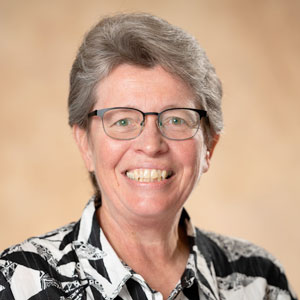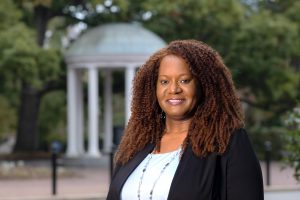The evidence that North Carolina desperately needs more social workers has never been clearer. Couple the estimated shortfall of nearly 24,000 social workers over the next seven years with the reality that fewer than 800 students, on average, graduate annually from the 12 master of social work programs within the UNC system, and the math adds up to one looming equation: a gigantic challenge to shore up the state’s workforce in the areas of child welfare, aging, disabilities and especially among needed practitioners in mental and behavioral health.
For UNC School of Social Work leaders, this reality also points toward several solutions, including: the launch of an online MSW program to increase the number of professionally trained social workers to support the growing population of vulnerable and marginalized individuals across the state. In fact, UNC School of Social Work is on track to do just that in January 2024, when the first cohort of students enrolled in the School’s new online MSW program are expected to begin classes.

The proposed program, which is in the final stages of development and institutional review, is designed to mirror the existing campus-based MSW program in academic curriculum, faculty engagement, quality, rigor, and outcomes. To graduate, students must complete 62 credit hours in coursework online and two internships within the community. Moreover, like the students from the School’s campus-based programs, students graduating from the online program will be just as prepared for direct practice, management of nonprofit and public agencies, community practice, and leadership positions, said Tina Souders, the School’s director of digital learning and instruction.
“This new program is going to offer people not only a great opportunity to earn an MSW from a Top 10 school of social work, but it will allow them to do so right in their homes,” said Souders who is leading the development of the School’s online program.
In expanding its degree options to a virtual format, UNC School of Social Work will join 195 other accredited MSW programs across the nation, including other institutional peers with Top 10 programs, that offer students a primarily virtual path to a social work career. In particular, the program is expected to target non-traditional students within North Carolina and the Southeast who because of life circumstances, such as job requirements and location, cannot shift busy schedules or obligations to attend graduate school full time in Chapel Hill.
For School Dean Ramona Denby-Brinson, such an expansion is necessary to broaden the educational opportunities for residents in every corner of the state. Given that about 500 qualified MSW applicants have been turned away from UNC over the last four years — including individuals of color, residents from low-resourced households, and individuals in rural areas —the School must do more to expand its capacity, she said.
“This really is about access and our social work mission of inclusion,” she said. “We want to diversify the workforce and make sure that we’re preparing practitioners to work in all parts of our state and to serve in communities where the clients they are helping look like them. So, without a doubt, I believe our online MSW program will allow us to expand our capacity and produce the diverse workforce of social workers that North Carolina needs.”

Growing demand for Carolina’s MSW program
Since the School waived the Graduate Record Examination (GRE) from its admissions requirements in 2019, applications to UNC’s MSW program have nearly doubled over the last few years. Currently, the number of applications that the School receives to its MSW programs amounts to more than four times the total number of students it can physically accommodate.
On average, about 150 students are accepted into the MSW program annually. However, School leaders estimate that at least 100 additional applicants met admissions criteria each year over the last four years but were not admitted. Sharon Holmes Thomas, the School’s assistant dean for recruitment, admissions and financial aid, is confident a new online MSW program will not only enable the School to capture some of these additional applicants but also attract those who have been asking for the School to develop a virtual program.
Momentum for an online MSW at UNC gained significant traction during the COVID-19 pandemic, especially as many secondary and higher education classrooms across the country shifted rapidly to remote or hybrid remote learning environments. Although most colleges, universities and secondary schools have returned to in-person learning, online classrooms continue to be very popular options for many student candidates, Thomas said.
For example, over the past five years, more than 60% of those attending an information session on the School’s MSW program expressed interest in an online program, she said. And of those who were interested, 20% were people of color, and 75% were North Carolina residents.
“That’s what has been so interesting to me – that so many of the people interested in attending a graduate school remotely are from within our own state,” Thomas said. “And with a growing number of our peer institutions also considering online programs, if we’re going to remain competitive in this market, we have to address the educational demands that we’re seeing.”
Pathways to the online degree
For Souders, the last few years have been hyper-focused on the design and logistics of establishing an online program and ensuring that the program fits seamlessly into the School’s degree portfolio. As a long-time educator, who helped School of Social Work faculty pivot to remote learning during the pandemic, Souders sees the digital classroom as an attractive flexible space, especially for students who embrace technology and new ways of learning.
For example, the online MSW classes will include a mixture of live instruction delivered by the School’s world-class faculty and academic content and course work that students will have the flexibility to complete each week during a time that is convenient for them, Souders said. Having the option to choose where and when they learn, especially for professionals trying to balance school with other responsibilities, including a job and family, is crucial, she said.
“So, if it’s eight o’clock at night and the student is a parent who has just put the kids to bed and that’s the best time of day that they can set aside to learn, then that’s when they do it,” she said.
As proposed, the School expects to enroll 30 students in January 2024 and another 30 in August, with an anticipated maximum enrolled capacity of 215 by 2027. Souders is especially proud that the online courses will be taught by current clinical, tenure and tenure-tracked faculty.
“A lot of online programs use adjunct faculty, but our goal is to use our own faculty to build and teach our courses,” she said.
The online MSW team includes Stefanie Panke and Rich Stewart. Panke is the School’s first digital pedagogy coach and provides expertise in online learning and design thinking. Stewart is an instructional technologist with expertise in communications, design, website development and online instructional content development. Together with Souders and other academic leaders, the team is building activities into the curriculum that encourage online students to engage with faculty and with other students in real time. Every online student will also be assigned a student success coach to help each student build community with their peers, address challenges, and prevent isolation, which can occur in an online format, Souders added.
“Student success coaches will proactively reach out to students to see how they’re doing in class, to help them develop their plans of study and to make sure that they’re taking the courses they’re supposed to take and getting the credits they need,” she said. “They are going to play a crucial role in the success of the students.”
Strengthening the workforce

In launching the online MSW program, School leaders are also aiming significant efforts toward addressing the state’s current social work labor shortage. Although the number of licensed clinical social workers in North Carolina has grown over the last 10 years to around 15,000, demand continues to outpace supply. The U.S. Bureau of Labor Statistics predicts that North Carolina’s need for professionally trained social workers will grow 9% to 12% by 2031.
Job openings for practitioners with expertise in counseling, mental health and substance use are expected to grow even more, especially in rural communities, where residents often live in poverty and lack access to any health or behavioral health care providers, said Valerie Arendt, executive director of the N.C. Chapter of the National Association of Social Workers. Moreover, a recent report from the N.C. Institute of Medicine found that individuals in these same households are more at risk for poor health outcomes.
That social workers have moved to the frontlines where traditional doctors, psychiatrists and other health professionals are not available isn’t surprising, Arendt said. In fact, across the country, licensed clinical social workers are now the primary providers of mental health, substance use, and behavioral health services and interventions.
“In North Carolina, at least 61 of our 100 counties don’t have a single psychiatrist,” Arendt said. “Why? Because psychiatrists tend to live in areas where people have insurance.”
In fact, demand for more social workers is increasing so much that shortages over the next seven years are predicted for the following positions:
- 13,300 mental health and substance use social workers to assist individuals seeking treatment for mental illness or substance use,
- 19,900 health care social workers to assist aging populations and,
- 29,100 child, family, and school social workers to work with families to strengthen parenting skills, prevent child abuse, and find alternative homes for children who are unable to live with their biological families.
Although having more trained social work graduates from UNC each year will not completely solve the state’s labor shortage problem, North Carolina will certainly benefit from having a larger pool of licensed practitioners, Arendt said.
“With UNC’s expansion to an online program, these new graduates are going to help more North Carolina residents gain access to needed services,” she added.
Long-term, the goal isn’t just about recruiting more students to the social work profession, added Denby-Brinson, who has been eager to launch an online MSW since being named School dean in August 2021.
“For us, this is about attention to quality,” she said. “This has never been about a race to be the biggest online program. Our race is focused on having the highest quality online MSW program.”


